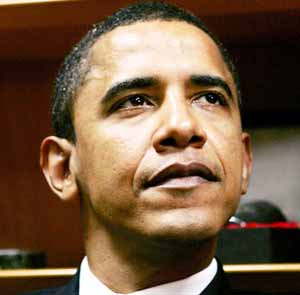Obama aims to coax China into broader global role
 Beijing - Chinese leaders are expected to remain cautious this week as US President Barack Obama encourages them to take a broader role in global affairs to reflect China's growing importance in trade, finance, climate change and other areas.
Beijing - Chinese leaders are expected to remain cautious this week as US President Barack Obama encourages them to take a broader role in global affairs to reflect China's growing importance in trade, finance, climate change and other areas.
Obama will promote his administration's new concept of "strategic reassurance" as he seeks to build a practical partnership with Beijing's ruling Communist Party.
China has designated the event as the first state visit by a US president for 12 years.
The upgrading of the diplomatic language reflects optimism on both sides that they can work more closely on global trade, finance and climate change.
In a speech in Tokyo on Saturday, Obama said US alliances with Japan, South Korea, Australia, Thailand and the Philippines "continue to provide the bedrock of security and stability" in Asia.
But he said it was "important to pursue pragmatic cooperation with China on issues of mutual concern, because no one nation can meet the challenges of the 21st century alone."
"That's why we welcome China's effort to play a greater role on the world stage - a role in which their growing economy is joined by growing responsibility," Obama said. "China's partnership has proved critical in our effort to jump-start economic recovery."
He lauded China for promoting security and stability in Afghanistan and Pakistan, as well as its role in attempting to denuclearize the Korean Peninsula.
"So the United States does not seek to contain China, nor does a deeper relationship with China mean a weakening of our bilateral alliances," Obama said. "The rise of a strong, prosperous China can be a source of strength for the community of nations."
Many analysts see increased dialogue and cooperation as essential given the growing economic interdependency between the United States and China, which holds US treasury bonds worth more than 700 billion dollars.
"The level of intertwinement between the two economies has reached the point where they have effectively merged," said US analyst Zachary Karabell, who called new phenomenon "Superfusion" in the title of his recent book.
Yet China's leaders remain unsure about how they should try to develop their global role and partnership with the United States, said David Shambaugh, a China expert at the Washington-based Brookings Institution.
"There's a huge debate and identity crisis among China's foreign policy elite," he said.
Shambaugh said he saw China as a nation with an "increasingly assertive and nationalistic identity" that is still asking "what kind of power are we?"
China has won praise for its role in international diplomacy to rein in the nuclear programmes of North Korea and Iran.
Obama and Chinese President Hu Jintao are also expected to discuss Afghanistan, Pakistan and Asian regional issues.
"In general, I think Obama takes China as a centre in Asia to carry out his economic and diplomatic policies," Wu Xinbo of the US Studies Institute at Shanghai's Fudan University told the German Press Agency dpa.
Obama is likely to prod China again to allow more appreciation of its renminbi currency, which some Western politicians have accused China of deliberately undervaluing to make its exports cheaper.
Hu could raise China's concerns over the alleged US trade protectionism, its continuing refusal to recognise China as a full market economy, and its controls over high-technology exports, Wu said.
Although military ties with China have improved despite several hiccups in recent years, US officials remain disappointed by the lack of practical cooperation and the continuing veil of secrecy over much of China's military policy and operations.
"Lingering strategic mistrust in the military arena" is "out of whack with the rest of the relationship," Shambaugh said.
Beijing's claim to most of the South China Sea, much of which lies hundreds of miles from the Chinese mainland, puts it at odds with several South-east Asian nations and creates military tension with the United States.
China is concerned about a possible US containment strategy and annoyed by continuing US arms sales to Taiwan, which the Communist Party still sees as a breakaway province of China.
Some US officials have expressed concern at China's development of military capabilities that include anti-satellite and other "space war" weapons, cyber-warfare, advanced planes and submarines, and apparent plans to build an aircraft carrier.
Wu said Taiwan was one of the main military issues limiting the development of bilateral ties between Beijing and Washington.
Chinese and US officials did put a positive spin on the visit to Washington last month by the high-ranking general Xu Caihou, a vice chairman of the party's Central Military Commission.
US and other Western military officials have also welcomed the chance to get closer to Chinese soldiers during recent UN peacekeeping missions and international anti-piracy patrols in the Gulf of Aden.
Chinese officials hope Obama will agree to issue a US statement reaffirming China's right to rule Tibet.
Obama could raise human rights issues, at least in broad terms, during a televised meeting with students in Shanghai on Monday.
But activists and rights groups are worried that human rights and democratic reform, areas where China still has serious problems, may take a back seat to Obama's new drive to engage China. (dpa)